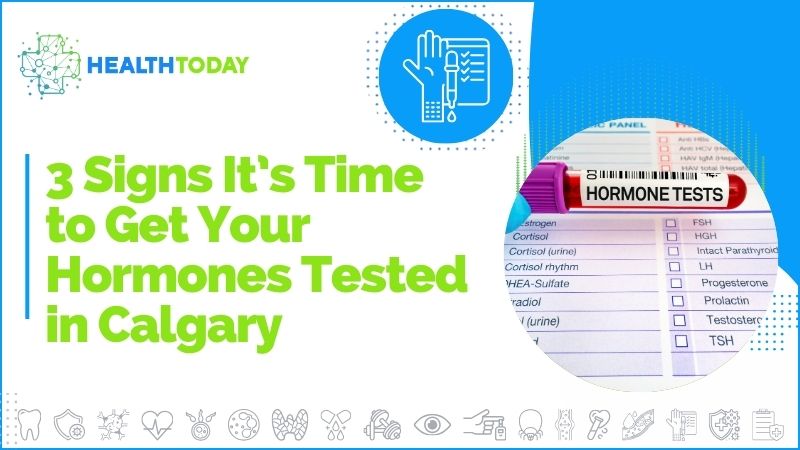
Are you constantly feeling tired, struggling with unexplained weight gain, or experiencing mood swings? These could be signs of a hormone imbalance. Hormones play a key role in regulating everything from your energy levels to your emotional well-being. If you’re in Calgary & noticing symptoms like persistent fatigue, difficulty losing weight, or unexpected changes in mood, it may be time to consider hormone testing. At Health Today, we help identify hormone imbalances that could be affecting your health & quality of life. By testing your hormone levels, we can guide you toward the right treatment, helping you regain balance & feel more like yourself again. Don’t ignore these signs— call us to get started on your hormone testing!
Hormones play a crucial role in regulating many of our body’s processes, from mood and energy levels to metabolism and reproductive health. When hormone levels are out of balance, it can affect your overall well-being in ways that might not be immediately obvious. At Health Today, we believe that understanding the signs of a hormone imbalance can help you take the right steps toward better health. In this blog, we’ll explore three common signs that it may be time to get your hormones tested.
Hormones are chemical messengers that regulate essential bodily functions such as sleep, mood, energy, and metabolism. When these levels are too high or too low, it can lead to a range of symptoms that may interfere with daily life. In Calgary, hormone testing is a valuable tool for diagnosing and managing these imbalances, helping you regain control of your health. If you’ve been feeling “off” or noticing changes in your body, it might be time to consider hormone testing. Here are three signs that indicate you could benefit from getting your hormone levels checked.
Feeling tired is something we all experience from time to time, but if you’re dealing with constant fatigue that doesn’t improve with rest, it could be a sign of a hormone imbalance. Hormones like cortisol, thyroid hormones, and insulin play a significant role in energy regulation. When these hormones are out of balance, your energy levels can drop, leaving you feeling sluggish or drained even after a full night’s sleep.
How Hormones Affect Energy:
If you’ve been experiencing ongoing fatigue with no clear cause, hormone testing can help identify whether an imbalance is the root of the problem. Proper treatment can restore your energy levels and improve your quality of life.
If you’re following a healthy diet and exercising regularly but still struggling to lose weight—or if you’re gaining weight without any significant changes in your lifestyle—hormonal imbalances could be to blame. Hormones like insulin, estrogen, and thyroid hormones have a major influence on metabolism and fat storage.
Hormones and Weight:
Hormone testing can help uncover whether your weight struggles are linked to an imbalance. By identifying the problem and addressing it through treatment or lifestyle changes, you can achieve better results in managing your weight.
We all have mood changes, but if you’re experiencing extreme shifts in mood, anxiety, or depression that seem out of proportion to your daily stressors, your hormones may be at fault. Hormones like estrogen, progesterone, testosterone, and cortisol play a vital role in regulating mood and emotional well-being.
How Hormones Impact Mood:
If you’ve noticed changes in your emotional state, from increased anxiety to unexplained sadness, hormone testing may provide answers. By identifying imbalances, your healthcare provider can recommend treatment options to help stabilize your mood and improve your mental well-being
Hormone imbalances can have a significant impact on your physical and emotional health, and many people don’t realize that symptoms like fatigue, weight gain, and mood swings can be tied to their hormone levels. If you’re experiencing these issues and haven’t found relief through lifestyle changes or other treatments, it might be time to consider hormone testing.
At Health Today, we offer comprehensive hormone testing to help identify imbalances and guide you toward the right treatment. With a better understanding of your hormone health, you can take proactive steps to feel better, both physically and mentally. If any of the signs mentioned above sound familiar, don’t hesitate to call our clinic and schedule a hormone test. It could be the key to unlocking a healthier, more balanced life.
Follow your healthcare provider’s instructions, which may include fasting or scheduling the test at a specific time of day for accurate results. Call us if you have any questions!